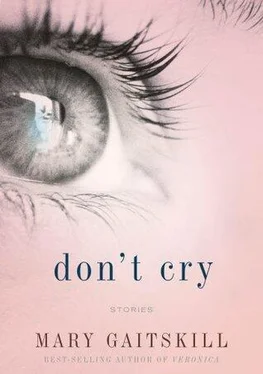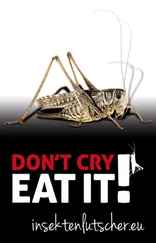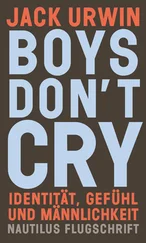We came out onto the street and saw it had rained. The pavement was steamy and darkly patched, and traffic moved with a shadowy hiss. The sky was pale, but gold light rimmed the rumpled horizon of old brick apartments, restaurants, and shops that had changed their names a dozen times in ten years. Dani said she'd walk me home. We walked past the wall layered with movie posters, and I saw that the circus tiger leaping through the rubbed-away eye of an actress had itself been rubbed away by the rain, leaving the image of a pale blue eye staring through rippling black stripes. I remembered the song “Today I'm Yours,” and I asked Dani if she knew what the blond singer was doing now. “I don't,” she said. “We lost touch somehow.” We walked in silence for a while. Another piece of glitter winked; in it I saw my parents, smiling at each other, kissing and embracing. Like an afterimage, I saw Dani's parents embracing, too. Tonight, David and I would make food for people; we would talk and there would be music. We would smile, kiss, embrace. Before we lost touch, or turned into something else, another person or a spirit or ashes or bones in the dirt with a stone on it.
Forgetting to look at the light, I stepped off the curb into traffic. A car swerved and braked as Dani yanked me back against her. The driver, remarkably dressed as a clown but without the red nose, shook his clown-gloved fist out the window as he sped past. We laughed. We let go. She said, “It's great to see you;” she said it like she always had. Then she walked away to be with Yasmin, and I walked away to be with David, hurrying now because I was late.
Mrs. Bea Davis walked through an enormous light-fluxing corridor of the Detroit airport, whispering to no one visible: “I love you. I love you so much.” The walls of the corridor were made of glowing translucent oblongs electronically lit with color that, oblong by oblong, ignited in a forward-rolling pattern: red, purple, blue, green, and pale green. “I love you, dear,” whispered Mrs. Davis. “I love you so.” You didn't love him , said the voice of her daughter Megan. You had nothing but contempt. Even when he was dying you— Canned ocean waves rolled through the corridor, swelling the colors with sound. “You don't understand,” whispered Bea. The ocean retreated, taking the colors solemnly and slowly back the other way: pale green, green, blue, purple, red. Red, thought Bea. The color of anger and accident. Green: serenity and life. She stepped onto a moving rubber walkway behind a man slumping in his rumpled suit. “I love you like I loved him,” she whispered. Very slightly, the rumpled man turned his head. “Unconditionally.” The man sighed and turned back. A woman with a small boy passing on the left peered at Bea curiously Does she know me? thought Bea. “What a wonderful idea,” she said out loud. “These lights, the ocean — like walking through eternity”
The woman smiled uncertainly and continued past; her little boy turned his entire torso to stare at Bea as his mother pulled him on. Maybe she did know me, thought Bea. We lived here long enough. She smiled at the little boy until he turned away a calf tethered at his mother's hips.
They had not lived in Detroit, but in the suburb of Livonia, in a neat brick house with a crab-apple tree in front of it. The tree had spreading branches that grew in luxuriant twists; in the spring it exploded with pink blossoms, and in the summer the lawn was covered with the flesh of its flowers. Megan and Susan ran through the yard with Kyle, the neighbor boy. Megan, seven, climbed the crab-apple tree, wrapping her legs around a branch and crowing for her mother to take a picture. Green, blue, purple. Red. It had not been a happy time for the family, and yet her memories of it were loaded with small pleasures. Dancing to the “Mexican Hat Dance” in the living room, the girls prancing around, and Mac swinging her in his arms, yelling, “A hundred pounds! A hundred pounds!” The willow trees on 8 Mile Road, the library with the model of Never Land, the papier-mâché volcano at the Mai Kai Theater, glowing with rich colors. Kyle and Megan putting on Gilbert and Sullivan's Mikado in a neighbor's garage with the little girls down the block — she had a picture of it in one of the photo albums: Kyle was very dashing in slippers and his mother's silk robe with black dragons on it. The little neighbor girls wore gowns with silk scarves tied around their waists. Megan, the director, wore a top hat and a mustache. Susan sat in the driveway with the other siblings and parents, her thin arms wrapped around her body, staring off into the sky.
At the end of the corridor was an escalator with people pouring onto it from all directions. Bea mounted it and stood still, while on her left people rushed facelessly past her. Going up, she felt as if she were falling, but falling where?
She had just come from a visit to Megan in upstate New York. Megan was a forty-two-year-old lawyer married to a travel writer— no children yet, but Bea hadn't given up hope entirely They had driven to Manhattan to see a play the windows down and country music on the CD. She was at first disappointed to see that they were seated in the mezzanine, but it was all right — the actors’ limbs were as subtly expressive as eyebrows or lips or the muscles of the neck. Afterward, they had dinner in a big open-faced restaurant on a cobbled street with tables spilling out, women sitting with their legs comfortably open under the tables, their bra straps showing a little and their chests shining slightly in the heat. There was a huge bar with the artful names of drinks written on a board above it, and a mirror behind it, and a great languidly stirring fan on the ceiling. Young men courted girls at the bar; a small girl with one knee on a tall stool leaned across the bar to order a round of drinks, and her silvery voice carried all the way to their table. They started with french fries served in a tin cone, with mayonnaise on the side. Bea wondered aloud what it would be like to have a glass of sherry, and Jonathan called the waiter, a grave-faced young man with an entire arm tattooed. “I like the casual air of this place,” she'd said. “I like the rough napkins instead of linen.”
“It's a nice place,” said Megan. “Though I've been noticing there's an awful lot of really ugly people here right now.”
“You think?” asked Jonathan. “You think it's changed over already?”
“Just look,” said Megan. Her voice was strangely hot, the way it would get as a little girl when she was overtired and about to get hissy “That guy is like an anteater in leisure wear. That girl, she can't wear that dress; look at her stomach.”
“You sound like Tomasina and Livia,” said Bea, “at Woolworth's and the Greyhound bus terminal. ‘Look at her, look at her.’ “
“What?” said Jonathan.
“Mom's talking about her sisters,” said Megan. “They would go on purpose to places where ugly poor people would be and comment on them. We didn't come here to do that; it's not the same thing.”
Not far off, thought Bea. Megan hated her aunt Livia, but here she was, saying, “Look at her.” Except without Livia's lightness. It was dead serious to Megan. At some other point during dinner, she'd said to her daughter, “You've always been so beautiful,” and Megan had said, “I certainly never thought that was your opinion.”
“How could you say that?” said Bea. And Megan was silent. A woman at the table next to them turned to look at Megan, then at her. Was this woman ugly, badly dressed? Bea had no idea. The waiter came back and informed them that they were out of sherry.
She looked up and saw the woman with the little boy halfway up the escalator; the boy was gazing intently down into the corridor of light. He was six or seven years old, heavyset, with dark, glowing skin, possibly Hispanic or part black. His mouth was full and gentle, and his eyes were long-lashed and deep, with a complicated expression that was murky and fiery at the same time. The child disappeared with the movement of the escalator; a moment later, Bea stepped off the clanking stair, unknowingly buoyed by his bright face. She looked at her watch; she had a layover of an hour and a half before her flight to Chicago. In front of her was a snack shop, a bookstore, and a store that sold knickknacks, decorative scarves, hats, and perfume. Decorative scarves and hats, thought Bea. The most gallant members of the accessory family.
Читать дальше












